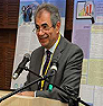Weakening the weak: A political economy of COVID-19 in Africa
Abstract
The coronavirus disease (COVID-19), which began in China at the end of 2019, is said to have infected over seven million people and has been responsible for the deaths of almost 600,000 people. It became a global emergency with its impact on the political, social, and economic lives of the entire world population. The International Monetary Fund and other sources have predicted that the effect of COVID-19 would include recession, and experts have claimed it would be orchestrated by commodity plummets, drops in tourism, inconsistent supply and demand, etc. Importantly, as COVID-19 advances in Africa, it is pertinent to address the peculiar nature of its impact on the African countries’ social, political, and economic atmosphere. The whole impact of COVID-19 seems to be weakening the weak African countries, considering the conspicuous challenges individual African countries are confronted with. This paper explores and explicates the political economy of COVID-19 in African countries. The paper was a desktop approach analysis of the political economy of COVID-19, and relevant materials were used from textbooks, the internet, and other journals.
References
[1]Sharma A, Sharma SK, Shi Y, et al. BCG vaccination policy and preventive chloroquine usage: Do they have an impact on COVID-19 pandemic?. Cell Death & Disease 2020; 11: 516. doi: 10.1038/s41419-020-2720-9
[2]Avery C, Bossert W, Clark A, et al. Policy implications of models of the spread of coronavirus: Perspectives and opportunities for economists. Available online: https://economics.mit.edu/sites/default/files/publications/w27007_0.pdf (accessed on 1 November 2023).
[3]Wu Z, McGoogan JM. Characteristics of and important lessons from the coronavirus disease 2019 (COVID-19) outbreak in China: Summary of a report of 72,314 cases from the Chinese Center for Disease Control and Prevention. Journal of the American Medical Association 2020; 323(13): 1239–1242. doi: 10.1001/jama.2020.2648
[4]Kaplan HS, Trumble BC, Stieglitz J, et al. Voluntary collective isolation as a best response to COVID-19 for indigenous populations? A case study and protocol from the Bolivian Amazon. The Lancet 2020; 395(10238): 1727–1734. doi: 10.1016/S0140-6736(20)31104-1
[5]Gilbert M, Pullano G, Pinotti F, et al. Preparedness and vulnerability of African countries against importations of COVID-19: A modelling study. The Lancet 2020; 395(10227): 871–877. doi: 10.1016/S0140-6736(20)30411-6
[6]United Nations. Policy brief: Impact of COVID-19 in Africa. Available online: https://unsdg.un.org/sites/default/files/2020-05/Policy-brief-Impact-of-COVID-19-in-Africa.pdf (accessed on 16 August 2023).
[7]Bisong A, Ahairwe PE, Njoroge E. The impact of COVID-19 on remittances for development in Africa. Available online: https://ecdpm.org/application/files/1516/5546/8632/Impact-COVID-19-remittances-development-Africa-ECDPM-discussion-paper-269-May-2020.pdf (accessed on 1 November 2023).
[8]Medinilla A, Byiers B, Apiko P. African regional responses to COVID-19. Available online: https://ecdpm.org/application/files/5916/5546/8629/African-regional-responses-COVID-19-discussion-paper-272-ECDPM.pdf (accessed on 1 November 2023).
[9]African Union. Impact of the coronavirus (COVID-19) on the African economy. Available online: https://www.tralac.org/documents/resources/COVID-19/3218-impact-of-the-coronavirus-covid-19-on-the-african-economy-african-union-report-april-2020/file.html (accessed on 1 November 2023).
[10]Lea R. The World Bank is the latest international body to downgrade growth prospects. Arbuthnot Banking Group 2019; 10(3): 23–40.
[11]Anjorin AA. The coronavirus disease 2019 (COVID-19) pandemic: A review and an update on cases in Africa. Asian Pacific Journal of Tropical Medicine 2020; 13(5): 199–203. doi: 10.4103/1995-7645.281612
[12]Aldridge RW, Lewer D, Katikireddi SV, et al. Black, Asian and Minority Ethnic groups in England are at increased risk of death from COVID-19: Indirect standardisation of NHS mortality data. Wellcome Open Research 2020; 5: 88. doi: 10.12688/wellcomeopenres.15922.2
[13]Shilomboleni H. COVID-19 and food security in Africa: Building more resilient food systems. AAS Open Research 2020; 3: 27. doi: 10.12688/aasopenres.13078.1
[14]Ardabili SF, Mosavi A, Ghamisi P, et al. COVID-19 outbreak prediction with machine learning. Algorithms 2020; 10(3): 249. doi: 10.3390/a13100249
[15]Sinclair RR, Allen T, Barber L, et al. Occupational health science in the time of COVID-19: Now more than ever. Occupational Health Science 2020; 4: 1–22. doi: 10.1007/s41542-020-00064-3
[16]Irogbe K. Globalization and the development of underdevelopment of the third world. Journal of Third World Studies 2005; 22(1): 41–68.
[17]Asongu SA. Fighting corruption in Africa: Do existing corruption-control levels matter? International Journal of Development Issues 2013; 12(1): 36–52. doi: 10.1108/14468951311322109
[18]Buheji M, da Costa Cunha K, Beka G, et al. The extent of COVID-19 pandemic socio-economic impact on global poverty. a global integrative multidisciplinary review. American Journal of Economics 2020; 10(4): 213–224. doi: 10.5923/j.economics.20201004.02
[19]Stephens KK, Jahn JLS, Fox S, et al. Collective sensemaking around COVID-19: Experiences, concerns, and agendas for our rapidly changing organizational lives. Management Communication Quarterly 2020; 34(3): 426–457. doi: 10.1177/0893318920934890
[20]Bong CL, Brasher C, Chikumba E, et al. The COVID-19 pandemic: Effects on low-and middle-income countries. Anesthesia & Analgesia 2020; 131(1): 86–92. doi: 10.1213/ANE.0000000000004846
[21]McLinden T, Stover S, Hogg RS. HIV and food insecurity: A syndemic amid the COVID-19 pandemic. AIDS and Behavior 2020; 24: 2766–2769. doi: 10.1007/s10461-020-02904-3
[22]Jakovljevic M, Bjedov S, Jaksic N, Jakovljevic I. COVID-19 pandemia and public and global mental health from the perspective of global health security. Psychiatria Danubina 2020; 32(1): 6–14. doi: 10.24869/psyd.2020.6
[23]Mutizwa B. COVID-19 a global nightmare: Revamping the Zimbabwean Health Sector (ZHS) for future epidemic and pandemic management. Journal of African Problems & Solutions (JAPS) 2020; 2(1): 59–73.
[24]ILO. Global employment trends 2011: The challenge of a jobs recovery. Available online: https://www.ilo.org/wcmsp5/groups/public/@dgreports/@dcomm/@publ/documents/publication/wcms_150440.pdf. (accessed on 2 November 2023).
[25]Hopman J, Allegranzi B, Mehtar S. Managing COVID-19 in low-and middle-income countries. Journal of the American Medical Association 2020; 323(16): 1549–1550. doi: 10.1001/jama.2020.4169
Copyright (c) 2023 Bashir Bello, Felix Amadi, Bello Salmanu Batsari

This work is licensed under a Creative Commons Attribution 4.0 International License.







.jpg)
.jpg)

